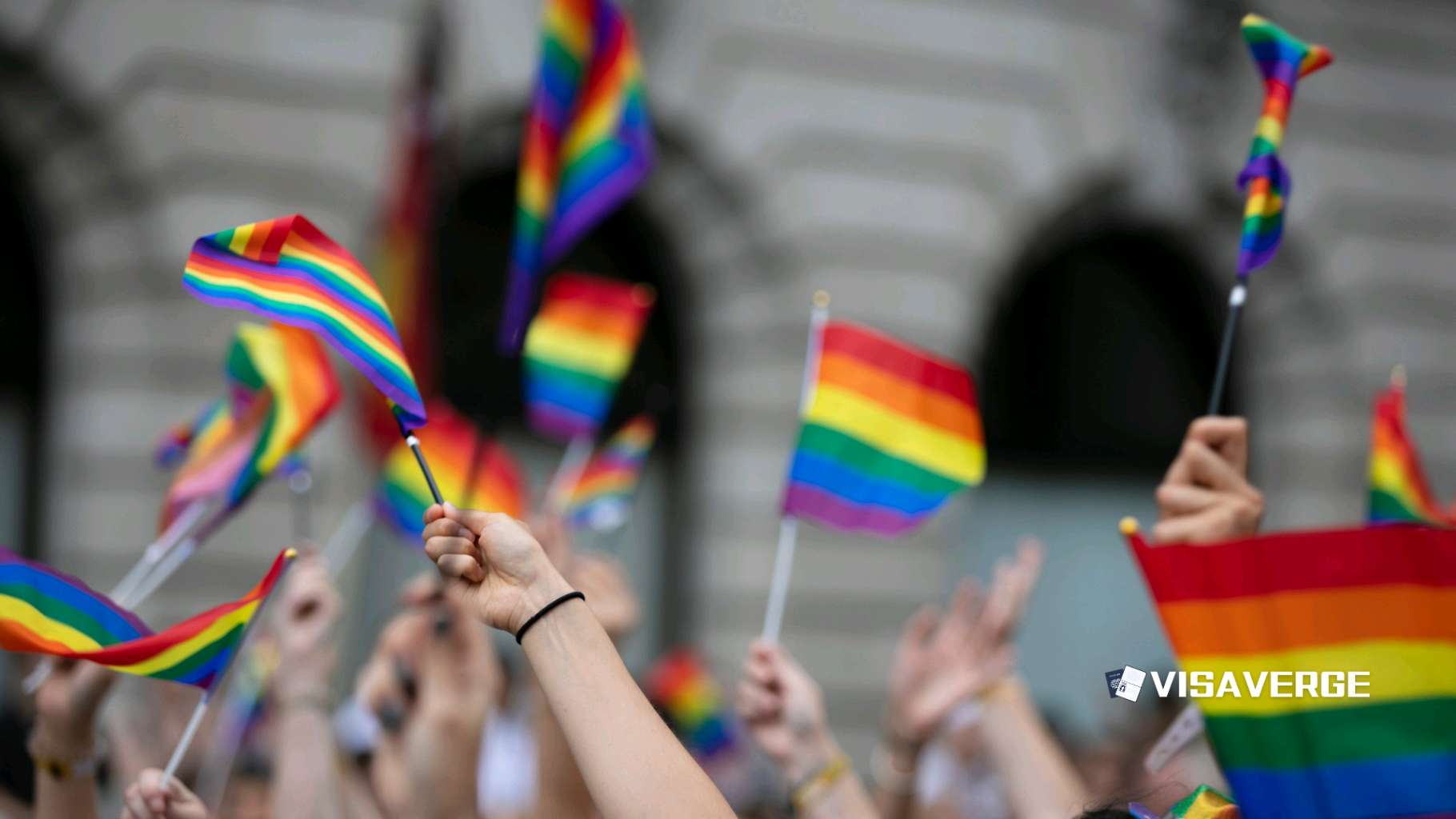Key Takeaways
• Executive Order 14168 redefined gender federally as male or female, ending recognition for transgender and nonbinary identities.
• U.S. passports no longer allow the ‘X’ gender marker, complicating travel for nonbinary and gender-nonconforming individuals.
• Several countries warned transgender travelers about potential discrimination when visiting the U.S. under new restrictive policies.
The political shifts in the United States under President Donald Trump’s administration have raised significant concern among LGBTQ+ individuals, particularly transgender and nonbinary travelers. Changes in federal policies, particularly those centered on gender identity, have introduced challenges that extend beyond national borders, prompting many LGBTQ+ individuals to rethink trips to the U.S. These changes, anchored in Executive Order 14168, question the nation’s commitment to inclusivity and have far-reaching implications for travel, tourism, global perceptions, and the daily lives of those directly affected.
Executive Order 14168: Redefining Gender and its Impacts

On January 20, 2025, President Donald Trump signed Executive Order 14168, titled “Defending Women from Gender Ideology Extremism and Restoring Biological Truth to the Federal Government.” This policy redefines gender strictly as male or female, determined by biological sex at birth. By removing recognition for transgender and nonbinary identities at a federal level, the order has reversed many advancements previously made toward gender inclusivity. Policies in federal agencies now exclude terminology such as “gender” and adopt “sex” instead, sidelining those who identify outside of the binary framework.
Critics of the executive order highlight its broad implications. By narrowing the legal recognition of gender, the order invalidates the identities of an entire community of people. For transgender and nonbinary individuals, this regression poses not just an ideological challenge but also practical hurdles, as federal documents and public services are now aligned with this restrictive definition. It has been described by LGBTQ+ advocates as a setback for dignity, equality, and basic recognition, with significant downstream effects on both domestic and international communities.
Suspension of Nonbinary Passport Options
One immediate and tangible result of the executive order is the suspension of the “X” gender marker on U.S. passports. Under Secretary of State Marco Rubio, this policy change eliminated the option for nonbinary or gender-nonconforming travelers to select the “X” designation, which was introduced in previous years as an alternative to “male” or “female.”
While existing passports bearing the “X” remain valid until expiration, no new applications with this designation are being processed. For those who identify as nonbinary or have transitioned genders, this restriction forces them to carry documentation that does not align with their true identity. Such mismatches can elevate the risk of profiling and discrimination at security checkpoints, both domestically and internationally.
The absence of proper identification creates practical and psychological burdens for the LGBTQ+ community. Travel, which should be a seamless and enriching experience, becomes a setting for potential judgment, questioning, and even harassment. For those navigating borders with misaligned identity documents, each checkpoint represents a renewed challenge.
Growing International Concerns and Travel Hesitations
The ripple effects of these new policies have extended far beyond U.S. borders. Several countries, including Finland 🇫🇮, Norway 🇳🇴, Denmark 🇩🇰, France 🇫🇷, Germany 🇩🇪, and the Netherlands 🇳🇱, have adjusted their travel advisories for citizens considering trips to the United States. Authorities in these countries warn transgender and nonbinary travelers about the increased likelihood of facing discrimination upon entering the U.S., noting potential complications with identification documents and scrutiny during immigration processes.
Such warnings reflect a significant shift in how allies perceive the U.S. under its current administration. International travelers—particularly those in the LGBTQ+ community—are increasingly weighing these risks against the potential rewards of visiting America. What was once considered a destination that championed freedoms and diversity is now being viewed in a new light, with hesitations growing in step with legal and social rollbacks.
This change is affecting more than just potential visitors. With declining confidence in America’s inclusivity, tourism from LGBTQ+ travelers is expected to drop, particularly from Europe. The United States, which has long positioned itself as a leader in civil rights innovation, is now facing questions about its global representation concerning progress and equality.
Domestic Advocacy and Legal Reactions
Within the U.S., the policy changes under President Donald Trump’s administration have activated a wave of legal challenges and advocacy campaigns. One of the most high-profile cases involves the American Civil Liberties Union (ACLU), which filed a federal lawsuit challenging the Trump administration’s decision to cancel over $1.1 billion in National Institutes of Health (NIH) grants. These funds had previously supported research on LGBTQ+ health disparities and gender-affirming care initiatives.
Advocates argue that the NIH funding cuts are driven less by fiscal strategy and more by ideological motives, undermining medical progress for marginalized communities. The lawsuit, alongside numerous efforts by LGBTQ+ organizations, seeks to address the systemic impacts of these federal policies. Many advocacy groups also decried a statement by President Trump, issued during National Child Abuse Prevention Month in April 2025, which characterized gender-affirming care as a form of abuse. Public health experts widely criticized this proclamation, clarifying that gender-affirming care is a medically endorsed and necessary treatment for transgender youth.
Challenges for LGBTQ+ Travelers
The changes enacted since Executive Order 14168 have inevitably altered the travel landscape for LGBTQ+ individuals. At U.S. ports of entry, stricter policies mandate greater scrutiny over documentation and enforcement of gender regulations. For travelers whose gender presentation or identity does not match their documents, entry into the country has become an unpredictable ordeal.
These new rules have placed border officials in positions where they actively question or challenge an individual’s identity if it does not align with binary categories. LGBTQ+ advocacy groups argue that such practices amount to systemic harassment, disproportionately affecting already vulnerable communities. As a result, many would-be visitors have opted to cancel or reschedule trips. Others, feeling uncertain about how they might be treated, have chosen to avoid the United States entirely.
This hesitancy directly impacts personal, cultural, and economic exchanges. Canceling trips out of fear of harassment undermines the idea of travel as a tool for learning and connection. Furthermore, as fewer LGBTQ+ tourists engage with the U.S., the broader economic repercussions for industries reliant on international visitors may begin to materialize.
The Broader Implications of These Policies
The policies introduced under President Donald Trump highlight a turning point for gender diversity in America. Beyond immediate travel-related complications, the systemic challenges prompted by Executive Order 14168 signal a shift in the nation’s broader framework for advancing equality. Federal decisions, including those on passport restrictions and funding for gender-affirming research, cast long shadows over global perceptions of inclusivity in the U.S.
The social impacts are equally pronounced. LGBTQ+ organizations report escalating distress in community members, particularly transgender youth and their families. The policy landscape has introduced new anxieties, from the potential loss of healthcare resources to fears about broader rights being rolled back over time. Meanwhile, U.S.-based schools and institutions grappling with denied resources related to diversity and inclusion initiatives are facing additional pressures.
Economically, the changes are likely to dampen revenue from LGBTQ+ tourists. VisaVerge.com estimates a potential decline in tourism spending as cautious travelers shift plans away from the U.S. The outcome may affect sectors reliant on vibrant, diverse tourist populations, aggravating broader economic challenges.
Conclusion
Under the Trump administration, the restrictive federal policies stemming from Executive Order 14168 are signaling a change to the wider global identity of the United States. The implications stretch from passport issuance bans for nonbinary individuals to funding cuts for healthcare research, placing marginalized groups in increasingly vulnerable positions. Strategic legal challenges and growing caution from international communities indicate just how complex these shifts are, impacting lives, human rights, and international relationships.
For LGBTQ+ travelers, practical concerns like misaligned identification documents now intersect with broader fears about dignity, belonging, and safety. As individuals and nations reconsider their tourism ties with the U.S., it becomes clear that policies addressing rights, recognition, and inclusivity have consequences far beyond borders. Staying informed and advocating for inclusive progress remains a global obligation, as the challenges to equality demand collective attention.
Learn Today
Executive Order → A legally binding directive issued by the U.S. President to federal agencies, with the force of law.
Nonbinary → An identity outside the traditional male or female binary, often used by people whose gender doesn’t conform to societal norms.
Gender Marker → A designation on official documents indicating an individual’s gender, such as male, female, or nonbinary.
ACLU → The American Civil Liberties Union, an organization defending civil rights and liberties in the U.S.
Gender-Affirming Care → Medical and support services helping transgender people align their physical appearance with their gender identity.
This Article in a Nutshell
Executive Order 14168 redefines gender as male or female in the U.S., impacting LGBTQ+ travelers. Nonbinary passport options are suspended, intensifying travel challenges. Several countries now warn LGBTQ+ citizens about discrimination risks in the U.S. Advocates continue to challenge these policies, signaling ongoing global and domestic repercussions.
— By VisaVerge.com
Read more:
• Canadian Travelers Told to Expect More Questions at U.S. Border
• Southwest Airlines Warns Travelers of Stricter Carry-On Bag Rules
• Southwest Airlines’ New Bag Rule Brings Unexpected Trouble for Travelers
• American Airlines Removes JFK Walkway, Leaving Travelers to Spend More
• Canadian Travelers Flying Less to U.S. as Preferences Change












